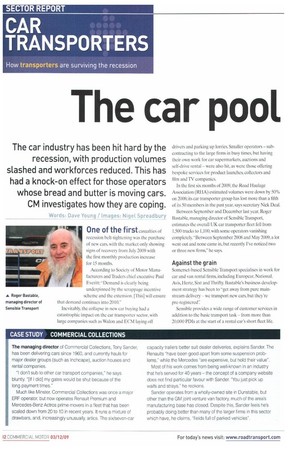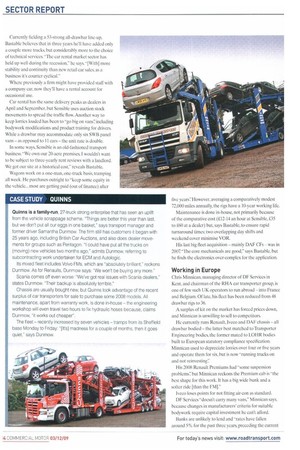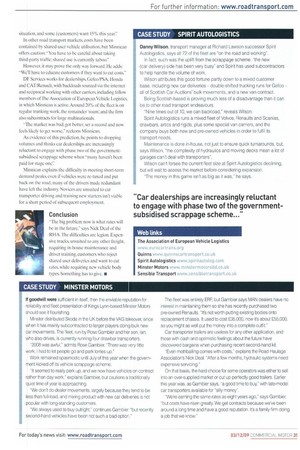The car pool
Page 34

Page 36

Page 37

If you've noticed an error in this article please click here to report it so we can fix it.
The car industry has been hit hard by the recession, with production volumes slashed and workforces reduced. This has had a knock-on effect for those operators whose bread and butter is moving cars. CM investigates how they are coping.
Words. Uave Young / images: Nigel. Spreadbury One of the first casualties of recession belt-tightening was the purchase of new cars, with the market only showing signs of recovery from July 2009 with the first monthly production increase for 15 months.
According to Society of Motor Manufacturers and Traders chief executive Paul Everitt: "Demand is clearly being underpinned by the scrappage incentive scheme and the extension. IThisj will ensure that demand continues into 2010."
Inevitably, the collapse in new car buying had a catastrophic impact on the car transporter sector, with large companies such as Walon and ECM laying off drivers and parking up lorries. Smaller operators — subcontracting to the large firms in busy times, but having their own work for car supermarkets, auctions and self-drive rental — were also hit, as were those offering bespoke services for product launches, collectors and film and TV companies.
In the first six months of 2009, the Road Haulage Association fRHA) estimated volumes were down by 50% on 2008; its car transporter group has lost more than a fifth of its 50 members in the past year, says secretary Nick Deal.
Between September and December last year, Roger Bastable, managing director of Sensible Transport, estimates the overall UK car transporter fleet fell from 1,500 trucks to 1,100, with some operators vanishing completely. "Between September 2008 and May 2009.a lot went out and none came in, but recently I've noticed two or three new firms," he says.
Against the grain
Somerset-based Sensible Transport specialises in work for car and van rental firms, including Europcar, National, Avis, Hertz, Sixt and Thrifty. Bastable's business development strategy has been to "get away from pure mainstream delivery — we transport new cars, but they're pre-registered:' Sensible provides a wide range of customer services in addition to the basic transport task — from more than 20,000 PD1s at the start of a rental car's short fleet life.
Currently fielding a 53-strong all-drawbar line-up, Bastable believes that in three years he'll have added only a couple more trucks, but considerably more to the choice of technical services. -The car rental market sector has held up welt during the recession," he says. "[With] mole stability and continuity than new retail car sales, as a business it's counter cyclical,"
Where previously a firm might have provided staff with a company car, now they'll have a rental account for occasional use.
Car rental has the same delivery peaks as dealers in April and September, but Sensible uses auction stock movements to spread the traffic flow. Another way to keep lorries loaded has been to "go big on vans" including bodywork modifications and product training for drivers. While a drawbar may accommodate only six SWB panel vans — as opposed to 11 cars — the unit rate is double.
In some ways, Sensible is an old-fashioned transport business. "We own our 20-acre premises, I wouldn't want to be subject to three-yearly rent reviews with a landlord. We got our site at a historical cost," reveals Bastable.
Wagons work CM a one-man, one-truck basis, tramping all week. He purchases outright to "keep some equity in the vehicle.., most are getting paid (out of finance) after
five years' However, averaging a comparatively modest 72,000 miles annually, the rigs have a 10-year working life.
Maintenance is done in-house, not primarily because of the comparative cost (£12-14 an hour at Sensible, £35 to £60 at a dealer) but, says Bastable, to ensure rapid turnaround times; two overlapping day shifts and weekend cover minimise VOR.
His last big fleet acquisition — mainly DAF CFs — was in 2007 "The core mechanicals are good," says Bastable, but he finds the electronics over-complex for the application.
Working in Europe
Chris Minnican, managing director of DF Services in Kent, and chairman of the RHA car transporter group. is one of few such UK operators to run abroad — into France and Belgium. Of late. his fleet has been reduced from 48 drawbar rigs to 36.
A surplus of kit on the market has forced prices down, and Minnican is unwilling to sell to competitors.
He currently runs Renault, lveco and DAF chassis — all drawbar bodied — the latter best matched to Transporter Engineering bodies, the former mated to LOHR bodies built to European statutory compliance specification. Minnican used to depreciate lorries over four or five years and operate them for six, but is now "running trucks on and not reinvesting': His 2008 Renault Premiums had "some suspension problems'," but Minnican reckons the Premium cab is "the best shape for this work. It has a big wide bunk and a softer ride fthan the FM]."
lveco loses points for not fitting air-con as standard.
DF Services "doesn't carry many vans," Minnican says, because changes in manufacturers' criteria for suitable bodywork require capital investment he can't afford.
Banks are unlikely to lend and "rates have fallen around 5% for the past three years, preceding the current
situation, and some (customers.) want 15% this year':
In other road transport markets, costs have been contained by shared-user vehicle utilisation, hut Minnican offers caution: "You have to be careful about taking third-party traffic: shared use is currently taboo."
However, it may prove the only way forward. He adds: "We'll have to educate customers if they want to cut costs."
DF Services works for dealerships, Gefco/PSA, Honda and CAT/Renault, with backloads sourced via the internet and reciprocal working with other carriers, including fellow members of The Association of European Vehicle Logistics, in which Minnican is active. Around 20% of the fleet is on regular trunking work, the remainder 'roam', and the firm also subcontracts for large multinationals.
"The market was bad, got better, set a record and now feels likely to get worse," reckons Minnican.
AS evidence of this prediction, he points to dropping volumes and thinks car dealerships are increasingly reluctant to engage with phase two of the governmentsubsidised scrappage scheme when "many haven't been paid for stage one',
Minnican explains the difficulty in meeting short-term demand peaks, even if vehicles were re-taxed and put back on the road, many of the drivers made redundant have left the industry. Novices are unsuited to car transporter driving and training new starters isn't viable for a short period of subsequent employment.
Conclusion
"The big problem now is what rates will be in the future," says Nick Deal of the RHA. The difficulties are legion. Expensive trucks, unsuited to any other freight. requiring in-house maintenance and driver training, customers who reject shared user deliveries and want to cut rates, while requiring new vehicle body types. Something has to give. •














































































































































